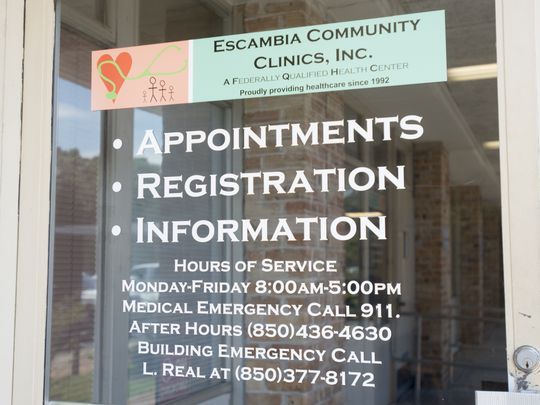PENSACOLA, FL |
Original article can be found at: http://www.pnj.com/
PENSACOLA, FL – The Escambia Community Clinic offers a variety of services throughout the county. Thanks to its partnership with both Baptist Health Care and Sacred Heart Health System they serve many of the area’s poor and uninsured population. Gregg Pachkowski/gregg@pnj.com
The U.S. Army veteran leaned heavily on his cane as he navigated the room, every shuffling step deliberate, labored, painful.
Homeless and hurting — a survivor of a stroke, congestive heart failure and a host of other illnesses— Washington Trotter Jr. had difficulty just crossing the length of the Waterfront Rescue Mission’s Day Resource Center. Still, it was infinitely preferable to crossing town to visit Baptist, Sacred Heart or West Florida.
Tucked into the middle of Waterfront’s campus for homeless services is a small health center staffed by employees of Escambia Community Clinics. The health care center was purposely placed to be accessible to folks like Trotter.
“Every time I go over, I can just walk in,” Trotter explained. “They see me the same day. They get me my medication the same day.”
More:Health care bill defeat a loss for Rick Scott
Accessibility is the name of the game for Escambia Community Clinics, a network of not-for-profit community health centers created for the express purpose of healing the impoverished and underserved.
ECC’s doctors, nurses and dentists can be found at school buildings, rolling through the community in mobile medical and dental vans and serving populations in Pensacola, Cantonment, Century and Milton.
“We’ve embraced this model called community-centered health, and basically it’s us as an organization reaching out beyond the exam room walls and intimately getting to know the communities that we serve,” said Chandra Smiley, ECC’s executive director.
In practice, that means meeting communities where they are. ECC currently has 13 sites — three of which were added within the past year — and plans to add two new sites to its network in the near future.
Whether it’s lack of transportation, lack of insurance or lack of income, Smiley doesn’t want barriers to keep people from being able to receive health care.
Last year alone, ECC provided more than $6.8 million in charitable care, serving more than 34,000 unique patients — usually the uninsured or working poor — during some 105,000 visits.
“Our mission is to provide care to our patients regardless of their ability to pay,” Smiley said. “We serve people who wouldn’t seek health care otherwise or they would seek it in inappropriate places like the (emergency room) … . We really try to make it simple.”
A safety net
Established in 1991, ECC was born out of the ashes of University Hospital, an Escambia County-owned facility that at the time of its closing was hemorrhaging about $2 million a year.
Officials realized that although closing the hospital made financial sense, doing so would create a void in affordable medical care options. One of the concerns among private hospitals was that if the public hospital went away, struggling families would turn to emergency rooms for treatment of illnesses like routine colds and ear infections. That would increase costs to patients and further clog waiting rooms bursting with people seeking treatment for actual emergencies.
More:Gaetz: Keep working to repeal and replace ObamaCare
Ultimately, the county closed the public hospital but came together with Sacred Heart Hospital and Baptist Health Care to fund Escambia Community Clinics as a safety net for indigent families.

Escambia Community Clinics provides affordable healthcare based on income to over 34,000 patients in Escambia County. There are over 13 sites with more to come. Read the full story on pnj.com Thursday evening and in print Sunday. Brandon Girod/cgirod@pnj.com
Guided by former Executive Director Donald Turner, ECC opened its doors in 1992 with a single location. In 2007, ECC qualified as a Federally Qualified Health Center, a designation that opened up a stream of federal grant funding and allowed the clinic to receive enhanced reimbursements for providing care to Medicaid and Medicare patients.
By the end of Turner’s 22-year watch, ECC had expanded to nine locations, with the Waterfront Mission clinic its most recent addition.
Turner retired in late 2014 and passed away in 2016, but his understudy, Smiley, has taken up the torch and ran with it. With a network of partners including the University of Florida, the Florida Department of Health, Children’s Home Society and the Escambia County School District, ECC has continued to expand and improve.
Since last year, ECC has opened a wellness cottage at C.A. Weis Elementary School dedicated to serving children, a pediatric and dental clinic in Cantonment and a women’s health clinic with a neighboring obstetrics residency program in Pensacola.
Altogether, ECC’s facilities provide a comprehensive suite of services including adult and pediatric family practices, behavioral health, dentistry, optometry, prenatal care, laboratory work, X-rays, pharmacy assistance, case management and other supportive services.
“Having multiple sites and portals of care is important,” Smiley said.
“It’s important for people to establish that medical home, so that when they get their wellness checks, they come here. That way when they get sick, they can come see us and do not go to the emergency room. (They) have that consistent continuity of care of a doctor and have a team that supports that doctor.”
More than 85 percent of ECC’s patients have an income below the federal poverty level.
For patients who fall below the federal poverty level, treatment is often free. For people between 101 and 150 percent of the FPL, the copay is just $5.
“It not only takes care of your visit, but if you need an X-ray, (the copay) takes care of your X-ray,” Smiley said. “If you need labs, it takes care of your labs. It’s not that we charge that copay over and over again.”
Smiley said a combination of local and federal funding offsets the costs of charity care and allows ECC to provide the lowest copays in the state.
Annually, ECC receives about $2.5 million in federal funding from the federal government, roughly $455,000 from Escambia County, and around $525,000 each from Baptist and Sacred Heart. ECC also gets additional funding from Santa Rosa County to operate the Milton location.
Smiley said it wouldn’t be possible for ECC to do what it does without all those entities coming together for the good of the community.
“That partnership and commitment remains today, as strong as it was in the early 90s,” Smiley said.
Community-centered health care
A young woman walked up C.A. Weis wellness cottage, trailed by a group of children.
Latavia McCarty had seen the sign for the community clinic in the parking lot and stopped in to see if they could check on her niece. Ten minutes after she arrived, a nurse had McCarty’s niece on an exam table, checking her vitals in a little room decorated with planets and stars.
McCarty said it was her first visit to the cottage, but she was thrilled to have a clinic right in the heart of the neighborhood.
“A lot of times, we can’t go to urgent care, and there are no options to get the kids in and out, especially if you’re a busy mom and you have kids in things like band,” she said.
ECC’s pediatric clinic at Weis opened in 2016 and is available to all children in the community, providing everything from check-ups to immunizations.
“Being in a school has provided greater access for lower-incomes families,” said Melissa Byrd, a pediatric nurse practitioner at Weis. “The kids don’t have to miss class, and the parents don’t have to miss work.”
Weis was Florida’s second “community school,” a concept emphasizing not only student education, but also health, community engagement and safety. It was made a reality in Pensacola through a partnership among the school district, Children’s Home Society and ECC.
The idea is to identify and address underlying issues that might be a barrier to a family’s growth and future success.
For instance, a number of Weis’ students come from Oakwood Terrace, a federally subsidized housing complex with high rates of crime and poverty. School partners learned many children from the complex went hungry on weekends, so they worked with Manna Food Pantries to send needy kids home with backpacks full of food.
ECC took the program a step further, starting a food insecurity program in Oakwood Terrace to teach the students’ parents and other residents of the community to cook healthier, shop healthier and, ultimately, think healthier. ECC also brought in speakers to talk about job opportunities, educational programs and other resources.
To assist in other communities where parents may lack time or transportation, ECC has a pair of vans — a medical van and a dental van — that travels to different school campuses and provide care on site.
It’s an example of how ECC’s mission goes beyond addressing just the obvious symptoms.
“It’s not the typical, ‘Come in, let’s talk about your potential diabetes or how you’re at risk for diabetes,'” Smiley said. “(Instead), it’s ‘Let’s get to know you so you trust us,’ and if they are sick and need care, it’s us that they think of to come to — not the emergency rooms or just foregoing treatment all together.”
The clinic at the Waterfront Mission is another example of the concept.
Dan Mines, affectionately known to his patients as “Dr. Dan,” conducted visits with more than 4,400 homeless patients last year.
Ailments can range from infected bug bites, to dehydration, to side effects of drug or alcohol abuse, to mental health disorders, to longstanding chronic illnesses. Mines sees most of his patients as walk-ins, because he knows doctor’s appointments rank comparatively low on his clients’ lists of daily priorities.
“If they can go to Action Labor and get a day’s work, and have to choose between, ‘I can either go to work and get enough money to eat, or I can go to the clinic,’ what would you do?” Mines asked rhetorically.
He said the goal was to make it easy for patients to get help, so medical staff could provide preventive care instead of reactive care. He noted ambulance rides often cost $600 to $800 and emergency room visits were $1,600 — costs his patients couldn’t afford and emergency medical organizations wouldn’t recoup.
Whenever possible, Mines pushes his patients to take advantage of the counseling, training and substance abuse programs at the Waterfront Rescue Mission.
“Our goal is to get them healthy enough to get them back to work, and then back on their feet,” Mines said.
One patient, Sonya Crawford, waited in a chair in the Day Resource Center, clutching at ribs she cracked in a fall. She said she had been able to get treatment and medication from Mines, along with information on housing programs from staff at the Waterfront Rescue Mission.
“I feel safe here,” Crawford said. “It’s like my family. It’s like my home. It’s been a blessing to me.”
A new home
For all of its growth over the past few years, it hasn’t been all smooth sailing for ECC.
In April 2014, ECC’s main headquarters at 2200 Palafox Street, the clinic at Waterfront Mission and a dental facility were all flooded during severe rains.
“Our main service delivery site … had about 2 1/2 feet of brown water throughout the entire facility,” Smiley said. “It hadn’t been our first flood, we had gone through several prior to, but it was probably the most devastating, and we just made a decision to not go back.”
ECC staff moved into the shell of an old motel at 14 W. Jordan St. While the team has made the building work, the setup is less than ideal.
The building was built in 1949, according to property appraiser records, and there’s barely enough room for ECC to function, let alone grow. The facility is a web of narrow hallways where doctors split time in exam rooms. The surrounding system of one-way streets outside make it difficult for ambulances to get in and out if a patient needs emergency care.
“It’s certainly not optimal,” Smiley explained wryly.
The good news is ECC has managed to secure a new home at the former site of Allie Yniestra Elementary School on West Jackson Street.
For the past several months, Greenhut construction crews have been retrofitting the building, removing old walls and putting up the frames for new offices, lobbies and exam rooms. The new main site will preserve some decorative elements from the old school, including placing theater-style seating from the school’s old auditorium in hallways and using wood planks from the stage for craft counter tops.
The construction is on track to wrap up in early 2018. When completed, the building will house ECC’s administrative offices, as well as provide adult primary care, a pediatric clinic, optometry, on-site pharmacy services through Thrif-T Drugs, mental health services and even a community garden.
ECC bought the building from the Escambia County School District for $675,000, and Smiley predicts renovating the structure into a clinic will cost in excess of $8 million with Federal Emergency Management Agency and New Markets Tax Credit covering a significant portion of that amount.
“For our providers, being able to have the exam rooms they need, they’ll be able to manage more patients,” Smiley said.
Though some services will transfer to the new headquarters, the facility on Jordan Street will remain in place and active.
“The 32505 ZIP code is where the majority of our patients reside,” Smiley said. “About 17 percent of our patients live there, so (our) being in that ZIP code makes access easier.”
The facility will ultimately be the crown jewel in a series of new ECC initiatives and programs.
In April, ECC opened a new pediatrics facility in Cantonment with medical, dental and behavioral health services. In an adjoining classroom, Head Start will provide classes for 3-year-old and 4-year-old pre-kindergarten students.
This year, ECC also launched a women’s health clinic across the street from the organization’s First Steps pediatric center, giving women a central site for both their and their children’s medical needs.
“We always offered women’s health services, but we really pulled those services out and created its own location,” Smiley said. “What we’ve been able to do by doing that is we partnered with Sacred Heart and the University of Florida to bring obstetrics residents on site, so we’re offering prenatal care and services, as well as the women’s health services.”
ECC has a dental clinic with seven chairs in the Florida Department of Health in Escambia County offices on West Fairfield. In office space on the same campus, ECC, Sacred Heart, University of Florida and the DOH are also preparing to launch a separate pediatric residency program for medical students.
Dr. John Lanza, director of the Escambia County DOH, said it made sense to put the program in the community rather than in a hospital because the environment was more representative of where the pediatric students would be working if they went into private practice. He added that the placement would be a boon for parents, who could get birth certificates or apply to programs like Women, Infants and Children supplement nutrition in the same building.
“It’s not quite a one-stop, but it’s getting close to that,” Lanza said. “It will be the largest hub for pediatrics clinical care, outside of hospital care, in Escambia/Santa Rosa counties.”
In addition, ECC is further expanding its health care offerings in the north end of Escambia County.
“We’re actively working with Lakeview in co-locating a primary care clinic up in Century,” Smiley said. “We’ve got a model here at the main campus on Lakeview where we have primary care right there with outpatient psychiatry, and that partnership has worked well in being able to really provide a comprehensive approach for patients, so we’re going to replicate that up in Century.”
Smiley said there was no one impetus for ECC’s recent growth, but a combination of community need, grant funding, organization-wide vision and like-minded partners had made it all possible.
“In everything we do, we think about the patients who are in need,” Smiley said. “That’s the reason we’re here.”
ECC’s sites are:
- Cantonment Medical Center, 748 U.S. Highway 29, Cantonment
- ECC at Lakeview Center: ECC Adult Family Practice Clinic, 1221 W. Lakeview Ave., Building E. ECC Pediatric Clinic, 1221 W. Lakeview Ave. (second floor of Children’s Service Center
- ECC Dental Clinic, 1295 W. Fairfield Drive, Pensacola
- ECC Main Appointment Clinic, 14 W. Jordan St.
- ECC Urgent Care, 14 W. Jordan St., Suite A&B
- ECC Century Pediatrics and Children’s Dental, 501 Church St., Century
- ECC Water Front Rescue Mission, 350 Herman St.
- C.A. Weis Elementary Wellness Cottage, 2701 North Q St.
- 12th Avenue Pediatrics (formerly Lanza Pediatrics), 2510 N. 12th Ave.
- ECC Women’s Health Center, 5855 Creek Station Drive
- Santa Rosa Community Clinic, 5520 Stewart St., Milton
- First Steps Pediatrics, 5868 Creek Station Drive, Building A
- ECC Cantonment Pediatrics and Children’s Dental, 470 South U.S. Highway 29, Cantonment
Share this Post













